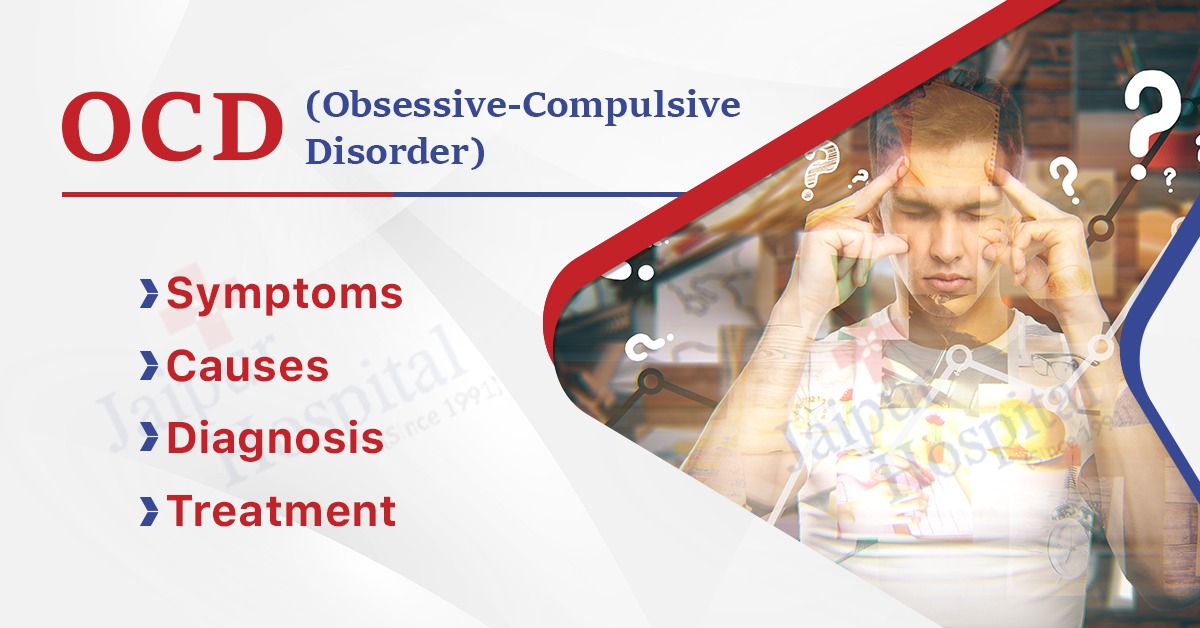What is OCD (Obsessive-Compulsive Disorder)?
The mental illness known as obsessive-compulsive disorder (OCD) is typified by intrusive, recurring thoughts known as obsessions that result in recurrent actions or thoughts known as compulsions that are carried out to reduce the distress these ideas create.
OCD sufferers frequently find themselves caught in a vicious circle of upsetting and illogical ideas, which drives them to participate in ritualistic activities as a coping mechanism for their worry. The cycle of anxiety and compulsive actions is sustained even if these routines could offer momentary respite from the obsessive thoughts. A person’s everyday life, relationships, and general well-being can all be profoundly impacted by OCD.
Effective diagnosis and treatment of OCD need an understanding of the nature of obsessions and compulsions as well as the variables that contribute to its development and persistence. We will explore the many facets of OCD in the talks that follow, including its signs and symptoms, etiology, diagnosis, and treatment options that can help people take back control of their lives.
Types of OCD:
Here are a few types of OCD listed below:
- Contamination OCD: Involves intense fears of germs or contamination, leading to compulsive rituals like excessive handwashing.
- Checking OCD: Characterized by persistent doubts and the need to repeatedly check things, such as locks or appliances, to prevent harm or disasters.
- Symmetry and Ordering OCD: Involves a fixation on order, symmetry, or specific arrangements, with compulsions to align or organize objects until they feel “just right.”
- Ruminations and Intrusive Thoughts: Features distressing, unwanted thoughts or mental images, often of a violent or taboo nature, causing significant anxiety.
- Hoarding OCD: Involves extreme difficulty discarding possessions, regardless of their actual value, leading to clutter and impaired living spaces.
- Counting and Repeating: Includes compulsive counting, tapping, or repeating words or phrases, driven by the need for a specific, “correct” sequence.
- Pure O (Purely Obsessional) OCD: Primarily consists of distressing intrusive thoughts without outwardly visible compulsive behaviors, leading to internal mental rituals.
- Just Right OCD: Involves a sense that things must be “just right” or a fear that something terrible will happen, leading to repetitive behaviors until a subjective feeling of completeness is achieved.
Symptoms of Obsessive-Compulsive Disorder:
Here are some symptoms that refer to OCD.
- Obsessions:
- Persistent, intrusive, and unwanted thoughts, images, or urges that cause significant anxiety or distress.
- Common themes include fears of contamination, harming others, or fears of making a mistake.
- Compulsions:
- Repetitive behaviors or mental acts performed in response to obsessions, aimed at reducing anxiety or preventing a feared event.
- Examples include washing, checking, counting, or mental rituals like repeating words silently.
- Avoidance:
- Individuals may go to great lengths to avoid situations or triggers that provoke their obsessions, leading to significant disruptions in daily life.
- Time Consuming:
- The obsessions and compulsions can consume a considerable amount of time, often interfering with work, school, or personal relationships.
- Interference with Daily Functioning:
- OCD symptoms can significantly impact a person’s ability to carry out routine activities and maintain a normal routine.
- Distress:
- Individuals with OCD often experience high levels of distress due to the intrusive nature of their thoughts and the time-consuming nature of their compulsive behaviors.
- Insight:
- While many individuals with OCD recognize that their obsessions are not grounded in reality, the distress is real, and they may find it challenging to control or stop the compulsive behaviors.
- Impact on Quality of Life:
- OCD can have a profound impact on overall well-being, leading to increased stress, difficulty concentrating, and strained relationships. It is crucial to recognize these symptoms early for effective intervention and management.
Also read: Aceruloplasminemia: Symptoms, Causes, Diagnosis, and Treatment
Causes of OCD:
Although the precise etiology of obsessive-compulsive disorder (OCD) is unknown, a mix of genetic, neurological, behavioral, cognitive, and environmental variables are probably involved. The following are some important variables that might lead to the emergence of OCD:
- Genetics:
- There is evidence of a genetic component in OCD. Individuals with a family history of OCD or related anxiety disorders may be at a higher risk.
- Brain Structure and Function:
- Abnormalities in certain areas of the brain, particularly the basal ganglia and the frontal cortex, may play a role in the development of OCD. These areas are associated with regulation of mood, behavior, and decision-making.
- Neurotransmitters:
- Imbalances in neurotransmitters, specifically serotonin, may contribute to OCD. Serotonin is a chemical messenger that plays a crucial role in mood regulation.
- Environmental Factors:
- Stressful life events, trauma, or significant life changes may trigger or exacerbate OCD symptoms in susceptible individuals.
- Learned Behavior:
- Some researchers suggest that certain behaviors associated with OCD may be learned or reinforced over time. For example, if a person discovers that a particular ritual temporarily reduces anxiety, they may be more likely to repeat that behavior.
- Cognitive Factors:
- Distorted thought patterns and cognitive processes, such as an exaggerated sense of responsibility or an intolerance of uncertainty, may contribute to the development and maintenance of OCD symptoms.
- Infection and Autoimmune Factors:
- Some studies suggest a possible link between childhood streptococcal infections and the onset of OCD, leading to the concept of Pediatric Autoimmune
Diagnosis of Obsessive-Compulsive Disorder:
The diagnosis of Obsessive-Compulsive Disorder (OCD) typically involves a comprehensive assessment conducted by mental health professionals. Here are the key steps and criteria involved in diagnosing OCD:
- Clinical Assessment:
- A mental health professional, such as a psychiatrist or psychologist, will conduct a thorough clinical assessment. This involves gathering information about the individual’s symptoms, medical history, family history, and overall functioning.
- Diagnostic Criteria:
- The diagnosis of OCD is based on specific criteria outlined in the Diagnostic and Statistical Manual of Mental Disorders, Fifth Edition (DSM-5), published by the American Psychiatric Association. The DSM-5 criteria include the presence of obsessions, compulsions, or both.
- Duration and Interference:
- To meet the diagnostic criteria, the obsessions or compulsions must be time-consuming (taking more than one hour per day) or cause significant distress or impairment in social, occupational, or other important areas of functioning.
- Rule Out Other Conditions:
- It’s essential to rule out other mental health conditions that may present with similar symptoms. For example, anxiety disorders, hoarding disorders, and certain types of personality disorders may share some features with OCD.
- Medical Evaluation:
- A medical evaluation may be conducted to rule out any potential physical causes of the symptoms. Certain medical conditions, such as neurological disorders, can present with symptoms similar to OCD.
- Collateral Information:
- Information from family members, friends, or other observers may be considered to gain a comprehensive understanding of the individual’s symptoms and their impact on daily life.
- Severity Assessment:
- The severity of OCD symptoms is often assessed using standardized measures, such as the Yale-Brown Obsessive Compulsive Scale (Y-BOCS), which helps quantify the severity of obsessions and compulsions.
- Co-occurring Conditions:
- It’s common for individuals with OCD to have co-occurring conditions, such as depression or other anxiety disorders. These may be assessed and addressed as part of the overall treatment plan.
Treatment of OCD:
The management of obsessive-compulsive disorder (OCD) frequently combines medicine, psychotherapy, and occasionally other therapeutic modalities. Assisting people in controlling their symptoms, lowering their level of discomfort, and enhancing general functioning is the aim. The following are typical OCD treatment options:
- Cognitive-Behavioral Therapy (CBT):
- Exposure and Response Prevention (ERP): This is a specific type of CBT considered the first-line treatment for OCD. It involves exposing individuals to thoughts, images, and situations that trigger anxiety (exposure) while preventing the accompanying compulsive rituals (response prevention). Over time, this helps reduce the anxiety associated with obsessions.
- Medication:
- Selective Serotonin Reuptake Inhibitors (SSRIs): These antidepressant medications, such as fluoxetine, fluvoxamine, and sertraline, are commonly prescribed for OCD. They work by increasing serotonin levels in the brain.
- Tricyclic Antidepressants (TCAs) or Clomipramine: These are older antidepressants that can also be effective in treating OCD, particularly when SSRIs are not sufficient.
- Augmentation Strategies:
- In cases where standard treatments are not fully effective, a healthcare provider may consider augmenting treatment with other medications or adjusting dosages.
- Mindfulness-Based Therapies:
- Mindfulness-based interventions, such as Mindfulness-Based Cognitive Therapy (MBCT) or Mindfulness-Based Stress Reduction (MBSR), can help individuals develop awareness and acceptance of their thoughts and feelings.
- Deep Brain Stimulation (DBS):
- In severe cases of OCD that do not respond to other treatments, deep brain stimulation, a surgical procedure involving the implantation of electrodes in specific brain regions, may be considered.
- Therapeutic Support Groups:
- Support groups, led by mental health professionals, can provide a supportive environment for individuals with OCD to share experiences, coping strategies, and insights.
- Family Therapy:
- Involving family members in the treatment process can be beneficial, especially in understanding and managing the impact of OCD on family dynamics.
- Lifestyle Modifications:
- Healthy lifestyle habits, including regular exercise, adequate sleep, and stress management, can contribute to overall well-being and may complement formal treatment.
Also read: Alcoholism (Alcohol Use Disorder): Causes, Risk Factors, Diagnosis, Symptoms and Treatment
Prevention of Obsessive-Compulsive Disorder:
It is difficult to completely prevent obsessive-compulsive disorder (OCD), as the condition is frequently caused by a complex interaction of neurological, genetic, environmental, and psychological variables. Nonetheless, the following tactics might lessen the likelihood or intensity of OCD symptoms:
- Early Intervention for Anxiety:
- Addressing and managing anxiety early in life may contribute to preventing the development of OCD. Teaching effective coping strategies and stress management skills can be valuable.
- Educating about Normal Development:
- Educate individuals, parents, and caregivers about the range of normal development in children. Recognizing and accepting variations in behavior can prevent unnecessary concerns and interventions.
- Promoting Healthy Coping Mechanisms:
- Encourage the development of healthy coping mechanisms to manage stress and anxiety. Teaching adaptive ways to deal with uncertainty and challenges can contribute to emotional resilience.
- Mindfulness and Relaxation Techniques:
- Introducing mindfulness practices and relaxation techniques can help individuals develop skills to manage stress and intrusive thoughts. These practices can be beneficial in preventing maladaptive responses.
- Promoting a Supportive Environment:
- Creating a supportive and understanding environment can contribute to emotional well-being, especially within families and schools. Reducing stigma around mental health issues encourages open communication and seeking help when needed.
- Addressing Trauma and Stressors:
- Identifying and addressing trauma or significant stressors early on can be crucial. Early intervention for traumatic experiences may help reduce the risk of developing mental health disorders, including OCD.
- Balanced Lifestyle:
- Encouraging a balanced lifestyle that includes regular exercise, sufficient sleep, and healthy nutrition can contribute to overall mental well-being.
- Limiting Perfectionism Pressure:
- Encourage a healthy attitude toward perfectionism, emphasizing the importance of effort rather than unattainable standards. Reducing excessive perfectionism may help prevent the development of OCD symptoms.
- Monitoring Media Exposure:
- Limit exposure to distressing or triggering content in the media, especially for individuals who may be susceptible to anxiety or obsessive thoughts.
- Educating about Mental Health:
- Promote mental health awareness and education to reduce stigma and encourage early recognition of mental health issues. Understanding that seeking help is a sign of strength can foster a proactive approach to mental well-being.


